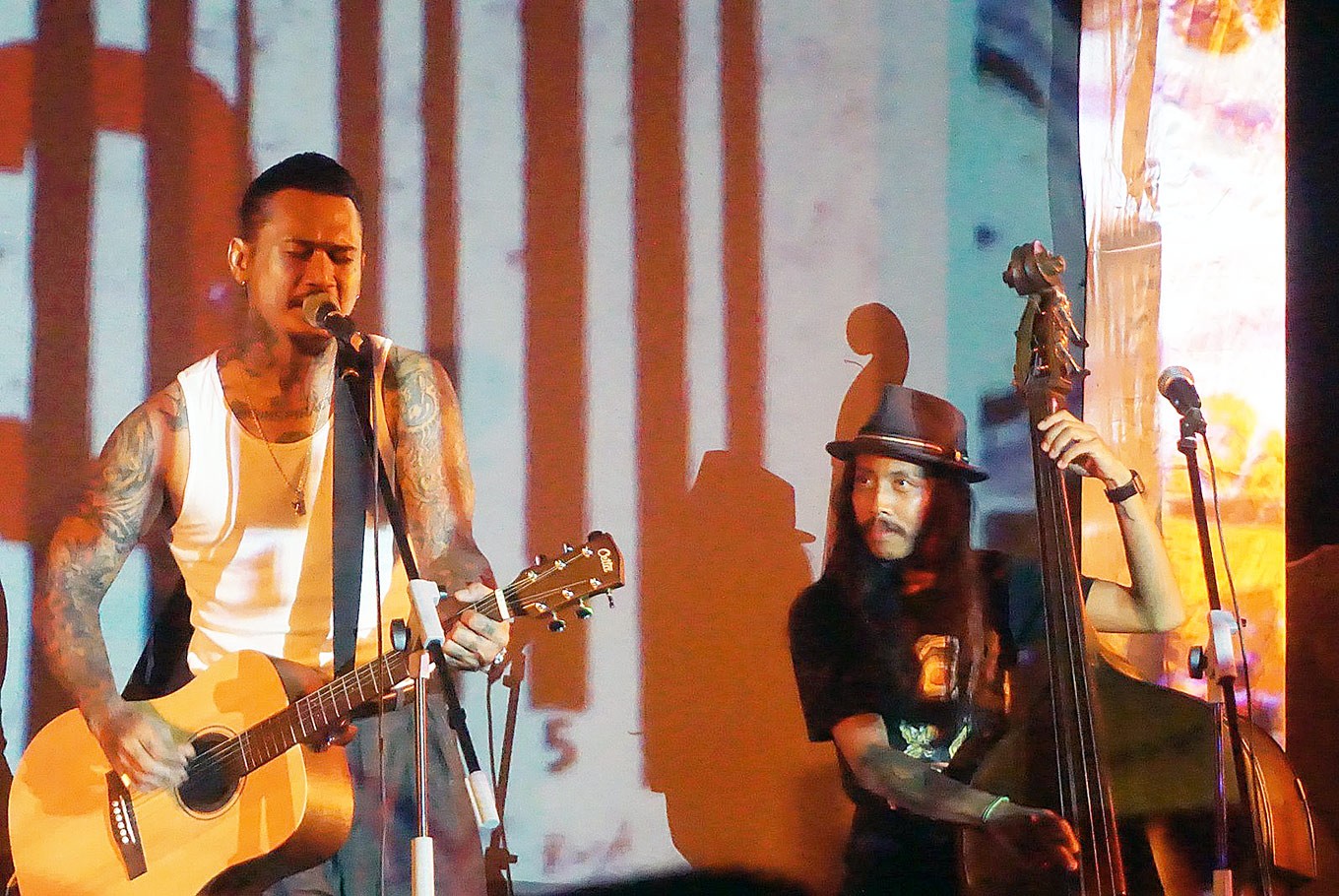Popular Reads
Top Results
Can't find what you're looking for?
View all search resultsPopular Reads
Top Results
Can't find what you're looking for?
View all search resultsBali's youths in search of 1965 history
Some Taman 65 community members tried to reconstruct the survivors’ memories by contacting and meeting with them firsthand.
Change text size
Gift Premium Articles
to Anyone
N
i Ketut Kariasih is at a loss for words when asked about the lyrics she wrote, as Roro Sawita patiently tries to jog her memory by speaking a bit louder directly into her ear.
“What song? I’d rather be tortured than sing a song,” said the elderly woman, also known as Bu Pasek, evading the issue.
Her friend, Pak Natar, guides her to a book filled with handwritten verses. Roro hands her the worn book, and Kariasih begins to read the elegant handwriting in it. Her facial expression changes, showing a smile as she peruses lyrics talking about the stem of a rose.
The scene with Bu Pasek was a snippet from a documentary, Sekeping Kenangan (A Fragment of Memory), woven out of amateur recordings of the Taman 65 youth community’s meetings with victims of the 1965 mass killing in Bali.
The documentary premiered at Taman Baca Kesiman, a public library in Denpasar, on March 29. Kariasih had already passed away by the time the documentary featuring her was screened.
Previously, the victims’ memories had been compiled in a book and music CD titled Prison Songs in 2015. The book contains narrations of the survivors once imprisoned in Bali, as well as the songs and poems they composed. These songs depict the political detainees’ tragic stories. The premiere also featured a concert of six songs written by the prisoners, including Kariasih, partly rearranged by the Taman 65 youths.
One of the stories in Prison Songs is about the tragic life of Kariasih.
In December 1965, amid the mass murders in Pekambingan, Denpasar, Kariasih was captured while carrying her youngest baby and taken to the military district command, where she was tortured every day during questioning.
She was charged with involvement in the murders of seven Army generals in Jakarta, which she knew nothing about. The murders, based on official Indonesian historical accounts, were part of a coup attempt of the Indonesia Communist Party (PKI).
While detained, Kariasih was informed by her eldest child that Pak Pasek, her husband, had also been detained and transferred to an unknown place with no further details.
Grief, suffering and torture plagued her relentlessly. After almost six months under military detention, Kariasih and her infant were sent to Pekambingan prison and released in August 1966 with the obligation to report daily to the military command.
Roro conducted research and mingled with a number of victims, like Kariasih in Bali, to work on the Sekeping Kenangan project.
“I’ve spent a lot of time with the survivors, chatting about their songs before and after 1965, what they remembered about their lost future and discrimination,” said Roro, the researcher who now resides in Australia.
The hunt for memories began in 2012.
Some Taman 65 community members tried to reconstruct the survivors’ memories by contacting and meeting with them firsthand.
Gde Putra, a community member, felt the strong emotion and communication in the songs collected from the scattered memories of the survivors.
“They were singing in order to survive torture in prison. Rather than a mere means of consolation, the songs are historical record,” Gde said.
Meanwhile, other community members approached musicians to get involved.
Blues singer Made Candra, also known as Made Mawut, was one of the first musicians who answered the call to participate, and took charge of handling musical compositions and rearrangements of the songs.
One of the songs that Made Mawut tracked down was “Tini dan Yanti” (Tini and Yanti), written by Ida Bagus Santosa from Klungkung, a lecturer of literature at Udayana University.
“Tini dan Yanti” was the poem Santosa wrote in memory of his wife, Tini, who gave birth to his baby girl, Yanti, when he was in prison.
Before Santosa disappeared without a trace, he scribbled the verses of “Tini dan Yanti” on the prison wall. According to former political detainees, Santosa could no longer be found in prison by the end of December 1965 or early January 1966.
Vocalist Rara Sekar and journalist Ananda Badudu then made a new arrangement of “Tini dan Yanti” out of the initial composition created by Made Mawut.
“Only a few could recall the lyrics of ‘Tini dan Yanti’. The basic tones weren’t complete as they were produced with no musical instruments,” Made Mawut said.
Another song featured during the concert was “Dekon” (Economic Declaration) by Ketut Putu, a young musician from Singaraja, Buleleng, and a member of the PKI-affiliated People’s Cultural Institute (Lekra).
Putu derived its lyrics from then-president Sukarno’s speech on March 28, 1963, in Jakarta with the same title, calling for economic independence.
Gunawarma from the band Nosstress sang the song in Balinese, which was famous before 1965.
“My older brother was shocked and scared about why I chose to present this song,” recalled Gunawarma.
So he discussed the matter with his mother, who remained haunted by traumatic memories of the gruesome incident and claimed to be frightened of saying anything related to communism.
Three male survivors — Natar, Jumpung and Jenawi — were very appreciative of what Taman 65 had done.
“I appreciate what young people are doing now,” said the 70-year-old Jenawi, who was a child soldier back in the 1960s.
“How did we survive confinement? We were convinced that history would free us to see our parents,” he added.
Sekeping Kenangan has proven that history is not owned by the state alone.
“I belong to the 1990s. So far, history has been controlled by the winners. I’ve searched for information and realized that I’m also a victim of the 1965 atrocities,” remarked Nyoman Angga, also a member of Nosstress.











